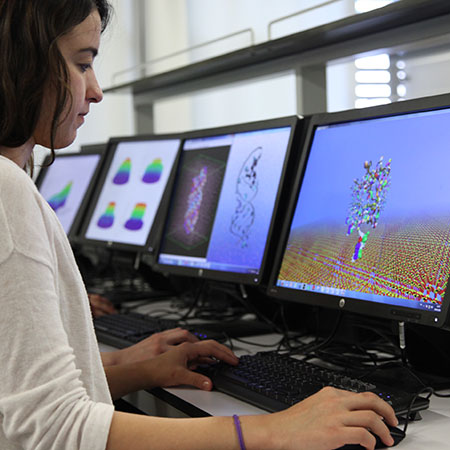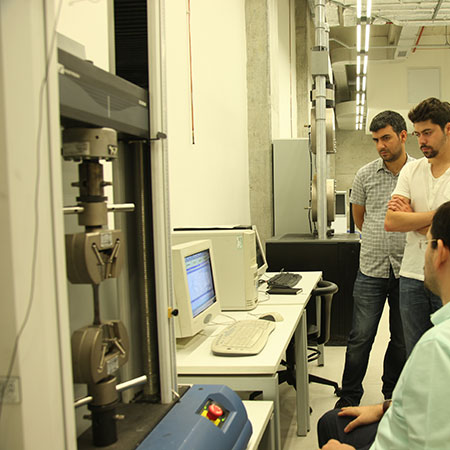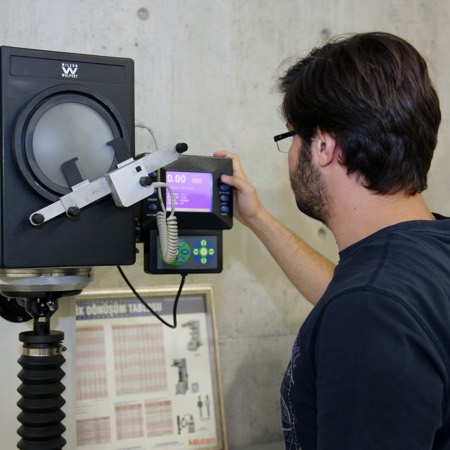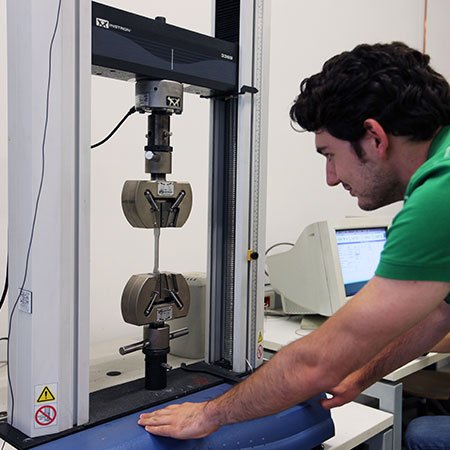Department Required Courses
| Course Code | Course Title | Prerequisite | Credits |
| ELE 101 | Introduction to Electrical Electronics Engineering | - | 1 Credit |
|
Elektrik-Elektronik Mühendisliği Bölüm öğrencilerini meslek alanları hakkında bilgi sahibi edindirme. Bölüm öğretim üyeleri, dersleri ve laboratuvar ekipmanları hakkında bilgi verme, mühendislik etiği kavramı hakkında bilgiler. |
|||
| Course Code | Course Title | Prerequisite | Credits |
| ELE 142 | Computer Programming II | BİL 141 | 4 Credits |
|
Introduction to object-oriented programming. Abstraction, encapsulation, polymorphism, inheritance, dynamic memory. C++ programming language. |
|||
| Course Code | Course Title | Prerequisite | Credits |
| ELE 201 | Circuit Analysis 1 | Prerequisite: MAT 101 and MAT 102 | 3 Credits |
| Fundamental concepts, node and mesh analysis, circuit theorems, energy and power. Superposition principle. Norton and Thevenin equivalent circuits. Supernodes and supermeshes. Mutual inductance. Operational amplifiers, first and second order circuits, natural response and forced response. Dynamic responses in multi-node and multi-mesh circuits. Simple state space equations. General expressions for the state-space solutions of first order circuits. Analysis of RLC circuits. | |||
| ELE 201L | Circuit Theory I Laboratory | Prerequisite: - | 1 Credit |
| Node and mesh analysis, superposition, analysis of dynamic circuits, applications of operational amplifiers. | |||
| ELE 263 | Logic Design | Prerequisite: - | 3 Credits |
| Binary systems and codes. Boolean Algebra. Digital logic gates. Simplification of Boolean functions. Combinational logic. Synchronous sequntial logic. Registers and counters. Memory and programmable logic, Asynchronous sequential logic. | |||
| ELE 263L | Logic Design Laboratory | Prerequisite: - | 1 Credit |
| Introduction to FPGA cards, FPGA-based circuit design. Implementation of the integrated development environment and experiments: (1) Usage of logic gates (2) Combinatorial Logic (adders, subtractors, etc.) (3) Sequence Detection, (4) Counters, (5) Memory, (6) Asynchronous Sequential Logic | |||
| ELE 273 | Probability for Electrical Engineers | Prerequisite: MAT 102 | 3 Credits |
| Sets, counting and fundamentals of probability. Independence, conditional probabiility. Random variables, probability mass and density functions, cumulative distribution function, joint probability mass and density functions. Expected value, variance, independence, conditional probability functions. Functions of random variables, transforms of random variables. Limit theorems, confidence interval. Introduction to random processes. | |||
| ELE 224 | Electronic Circuits | Prerequisite: ELE 201 | 3 Credits |
| Summary of semiconductor physics. Fundanemtals of PN junction diodes. PN junction diode circuits. DC, AC analysis and small-signal modeling of diode circuits. Full-wave and half-wave rectifiers. Zener diodes and limiting and regulating diode circuits. Switching diode circuits. Logic gates with diodes. Fundamentals of Bipolar Junction Transistors (BJTs) and Field Effect Transistors (FETs). DC analysis of transistor circuits. Load line method and working regions. AC analysis and small-signal modeling of transistor circuits. BJT switching. Logic gates. Biasing circuits. Single stage transistor amplifiers. Current mirrors. Regulators. | |||
| ELE 224L | Electronic Circuits Laboratory | Prerequisite: - | 1 Credit |
| General information about laboratory equipment and measurement devices. Measuring current and voltage and monitoring them with an oscilloscope. Diodes: a) Forward and reverse biasing b) Obtaining V-I characteristics c) Half-wave rectifier d) Full-wave rectifier e) Bridge rectifier f) Obtaining V-I characteristics of Zener diodes. BJTs: a) Six different methods in NPN BJT biasing b) Obtaining V-I characteristics in 4 quadratures c) Determining Early voltage d) Determining forward current gain. Amplifiers: a) Common emitter transistor DC biasing and gain b) Common base transistor DC biasing and gain c) Measuring gain as a function of frequency. FETs: a) DC biasing of JFET and obtaining characteristics b) DC biasing of MOSFET and obtaining characteristics. Amplifiers: a) Measuring gain of FET and MOSFET amplifiers b) Measuring gain as a function of frequency in FET amplifiers. | |||
| ELE 202 | Circuit Theory II | Prerequisite: ELE 201 | 3 Credits |
| Sinusoidal current and voltage. Phasors. Power and power factor. Resonance. Bode plots. Topology. Nonsinusoidal systems. Mutual inductance and transformers. Complex frequency domain. The concept of transfer function. Convolution. Fourier series and its application to circuit analysis. Two port circuits. h and y parameters. | |||
| ELE 231 | Electromagentic Field Theory | Prerequisite: MAT 101 and MAT 102 | 3 Credits |
| Vector analysis, scalar and vector products. Orthogonal coordinate systems, gradient, divergence, and curl operators. Gauss’ and Stoke’s theorem. Static electric fields and electrical potential, conductors and dielectrics. Capacitors and capacitance, electrostatic energy. Solution of electrostatic problems. Steady electric currents and Ohm’s law. Continuity equation and Kirchoff’s laws. Steady magnetic fields, vector potential, and Biot-Savart’s law. Magnetization and magnetic materials. Magnetic energy, force, and torque. | |||
| ELE 297 | Fundamentals of Electrical and Electronics Engineering | Prerequisite: MAT 101 and MAT 102 | 3 Credits |
| Basic Concepts. Node and Loop/Mesh Analyses. Circuit Theorems. Energy and Power. Source transformation. Super node and super loop. PN Diode. Zener Diode. Operational principles of field effect transistors (FET) and bipolar junction transistors (BJT) and their applications. Operational Amplifiers. Electric Motors and their drives. | |||
| ELE 371 | Signals and Systems | Prerequisite: MAT 101 and MAT 102 | 3 Credits |
| Continuous and discrete-time signals and systems. Feedback, memory, stability, time-invariance. Linear time-invariant systems described by differential or difference equations. Convolution. Fourier series and transform. Modulation. Nyquist Sampling Theorem. Z-transform. Transfer function and its canonical implementations. Impulse response of discrete systems, step and ramp responses. Zero-order hold. Frequeny domain analysis of discrete systems and determination of the low and high frequency regions, the filter concept. | |||
| ELE 311 | Analog Electronic Circuits | Prerequisite: ELE 224 | 3 Credits |
| Amplifiers. Single and multi-stage amplifiers. Differential amplifiers. 2-gate amplifier models. Frequency response, Bode plots. High frequency models of transistors and diodes, frequency domain design and analysis of amplifiers. Freedback and stability. OPAMPs and their applications. Electronic noise. Output stages, power calculations, power efficiency, classes of amplifiers, power amplifiers. | |||
| ELE 375 | Numerical Methods for Electrical Engineers | Prerequisite: MAT 201 and MAT 202 | 3 Credits |
| Numerical erros and their estimations. Roots of equations. Solution of linear equations. Gaussian eliminations. Solution of nonlinear equations, Newton method. Matrix methods, determinants, eigenvalues and eigenvectors, matrix expressions for linear systems. Optimization, convex optimization, constrained optimization, L1 minimization, FFT and spectral methods, approximation, interpolation, extrapolation. Ordinary and partial differential equations, their formulations, difference equations , numerical methods for solutions of difference equations, finite difference method, solutions of inital and boundary value problems, numerical derivative and integration. | |||
| ELE 331 | Electromagnetic Wave Theory | Prerequisite: ELE 231 | 3 Credits |
| Time-varying fields. Electromagnetic induction and Faraday’s Law. Maxwell equations, potential functions, electromagnetic boundary conditions. Wave equations and their solutions. Harmonic fields and the use of phasors in electromagnetic. Plane waves, polarization. Plane electromagnetic waves in lossless and lossy media. Group velocity and dispersion. Flow of electromagnetic power and Poynting vector. Boundary value problems in electromagnetic. Transmission line theory. | |||
| ELE 301 | Control Systems I | Prerequisite: MAT 202 | 3 Credits |
| Basic concepts. Modeling physical systems: Laplace Transform, Transfer Functions, Block diagrams, State Equations. Time and frequency domain analyses of control systems. Stability analysis, Root-Locus Technique, Bode and Nyquist plots, Compensators. | |||
| ELE 301L | Control Systems 1 Laboratory | Prerequisite: - | 1 Credit |
| Simulation of dynamic systems and on-off controller. Motor and tacogenerator properties and the effect of gain. Obtaining the frequency domain Bode plot of a fitler experimentally. Investigation of the Proportional, Derivative and Integral (PID) control elements. State space and state feedback. | |||
| ELE 361 | Introduction to Communication Systems | Prerequisite: ELE 273 and ELE 371 | 3 Credits |
| Amplitude Modulation (AM), Conventional, Suppressed Carrier (DSBSC), Single-Side Band (SSB) AM, Phase and Frequency Modulation and their spectral analyses. Random Processes. Effects of noise on amplitude and angle modulation, signal to noise ratio (SNR) analysis. Digital Transmission in the Additive White Gaussion Noise (AWGN) channel. Geometric Representation of signals. Pulse amplitude modulation (PAM), Basedband and bandpass signals. Multidimensional signal waves. Optimum receivers and signal estimation. Bit error probability analysis. Digital bandlimited transmission. | |||
| ELE 361L | Introduction to Communication Systems Laboratory | Prerequisite: - | 1 Credit |
| Amplitude Modulation. Superheterodyne Receivers. Mixers and envelope detectors. Bandpass, bandstop, highpass and lowpass filters. Spectrum analysis in angle and frequency modulation. Phase-locked loop. Voltage Controlled Oscillator. Usage of signal generators and spectrum analyzers. | |||
| ELE 362 | Microcontrollers and Applications | Prerequisite: ELE 263 or BİL 264 or ELE 264 or BİL 265 | 4 Credits |
| Introduction to microprocessors and their basic architectures; Embedded C language, arithmetic and logic operations, general purpose input and output ports, machine cycle, timer, pulse width modulation, Interrupt service routine, Controller Ara Networks, Serial Peripheral Interface, UART, power control, Real time clock, ADC, DAC programming. | |||
Elective Courses
An ELE student has to take 7 elective courses. One of the following two combinations can be chosen:
- 4 Departmental, 2 Engineering and 1 Non-technical electives.
- 5 Departmental, 1 Engineering and 1 Non-technical electives.
Departmental Elective Courses
| Course Code | Course Title | Prerequisite | Credits |
| ELE 401 | Linear Systems | Prerequisite: ELE 301 | 3 Credits |
| Review of transform techniques. Linear spaces, linear operators, range space and null space, eigenvectors, singular value decomposition, input, output and state, time varying and time invariant systems, discrete systems, linear system decompositions, observability, controllability, stability, detectability, stabilizability, reconstructability. | |||
| ELE 402 | Control Systems II | Prerequisite: ELE 301 | 3 Credits |
| Compensator design in frequency domain, modeling in the state space, eigenvalues and eigenvectors, linear transformations and solution techniques, controllability and observability, pole placement, Lyapunov method, observer design, introduction to optimal control, design and analysis of discrete time systems. | |||
| ELE 403 | Nonlinear Systems | Prerequisite: ELE 301 | 3 Credits |
| Nonlinear behavior, limit cycles, bifurcation, existence and uniqueness of solutions, phase-plane analysis, Lyapunov stability analysis, linearization, LaSalle invariance principle, comparison principle, converse theorems, passivity concept, strictly positive real transfer functions, passivity theorems, circle criterion and absolute stability, center manifold theorem, region of attractions, stability of perturbed systems, input-to-state stability, input-output stability and L2 gain, feedback linearization, Lie algebra, input-output linearization, input to state linearization, zero Dynamics and internal stability, stabilization and trajectory tracking problems, sliding mode control, passivity based control, backstepping, Lyapunov redesign, nonlinear observers | |||
| ELE 404 | Digital Control Systems | Prerequisite: ELE 301 | 3 Credits |
| Nyquist Sampling Theorem, z-transform, inverse z-transform, convolution property, initial value theorem, final value theorem, difference equations (MA, AR, ARMA, ARMAX), Approximation methods in order to obtain G(z) from G(s), mapping from s to z-domain, obtaining z transform for block diagrams, stability analysis, Jury stability test, Routh criterion, implementation methods (Direct, Serial, Parallel and Staircase), Root locus graphs and design, Raggazzini’s direct design method, discrete PID controller, state space representation in discrete time, structural properties (controllability, observability), Lyapunov stability analysis for discrete systems, pole placement (Bass-Gura and Ackermann methods), discrete time observers. | |||
| ELE 405 | Industrial Control Systems | Prerequisite: ELE 301 | 3 Credits |
| Process models, implementation issues of PID controllers, controller design, integrator flyback, PID gain determination and automatic parameter adaptation, microprocessor, microcontroller-based control, instrumentation, process control, flow control, heat control. | |||
| ELE 406 | Automotive Control Systems | Prerequisite: ELE 301 or MAK 305 | 3 Credits |
| Fundamentals of vehicle Dynamics; feedback control, PID control review; Electronic stability control, Adaptive speed and cruise control, Lane keeping applications; Mathematical modeling and computer aided simulations (MATLAB/Simulink, Octave); Basics of modern control techniques: Lead-lag compensations, LQR/LQG Control, H-Infinity and Robust Control. | |||
| ELE 411 | Robotics | Prerequisite: ELE 301 | 3 Credits |
| Robot manipulators, representations and transformations, forward kinematics, Denavit-Hartenberg representation, inverse kinematics, linear and angular velocities, static forces, Jacobian matrix, singularities, manipulator dynamics, accelerations, quasi-static analysis using the virtual work approach, direct and inverse dynamics using the Newton-Euler and Lagrange equations, trajectory planning and the spline method, manipulator control, linear and nonlinear control methods, independent joint control, coordinate joint control using computed torque method, compliance, compliant motion control, force control. | |||
| ELE 412 | Mechatronics Systems Design | Prerequisite: ELE 301 | 3 Credits |
| Mechatronics as an interdisciplinary design approach, design principles, mechanical design, electronic system design, software de development for specific hardware, data collection and interface, hardware in the loop, modeling, control, logic, sensors and actuators, mechatronics instrumentation, intelligent systems, mini, micro and nano scale systems, industrial software and hardware examples. | |||
| ELE 413 | Electrical Machinery Design | Prerequisite: - | 3 Credits |
| Asynchronous machine design: design fundamentals, determining size, chose of number ducts, windings, parameter calculations. Synchronous machine design: determining size, windings and parameter calculations Optimal design of synchronous and asynchronous machines. | |||
| ELE 414 | Fuzzy Logic | Prerequisite: - | 3 Credits |
| Crisp and fuzzy variables, membership functions and membership values, rule base, parametric membership functions, fuzzyfication and defuzzyfication methods, inference, combination of premises, rule activation level, function approximation, adaptive fuzzy systems, application areas of fuzzy systems, and analysis of application details. | |||
| ELE 415 | Drive Systems | Prerequisite: - | 3 Credits |
| Velocity control methods in DC motors and applications. Working in four quadrants. Asynchronous motor speed control methods and applications: voltage controlled speed control, frequency controlled speed control, speed control with constant field, rotor resistance speed control. Inverters and Pulse Width Modulation techniques. Working principles of step motors. Working principles of reluctance motors. | |||
| ELE 416 | Intelligent Systems | Prerequisite: - | 3 Credits |
| Artificial Neural Networks, fuzzy logic and genetic algorithms. Feedforward and feedback Networks, Learning algorithms with and without a trainer, use of intelligent systems in System diagnostics, control, signal and image processing. | |||
| ELE 417 | Introduction to Electrical and Hybrid Vehicle Technologies | Prerequisite: - | 3 Credits |
| History of electrical and hybrid vehicles, configurations, used battery structure and topologies, motor structures, circuits. DC and AC electric motors, brushed DC mmotors, brushless electric motors, power electronics and motor operations. | |||
| ELE 421 | Semiconductor Device Technology | Prerequisite: - | 3 Credits |
| Introduction to semiconductor technology. Semiconductor materials. Semiconductor devices and pn junction diodes. Bipolar junction transistors, Field Effect Transistors. Semiconductor material production and processes. Termal processes, photolithography, plasma processes, ion implantation, etching, CVD, metallization, CMP, integration, semiconductor device production, Introduction to MEMS | |||
| ELE 422 | Cmos VLSI Design | Prerequisite: ELE 263 | 3 Credits |
| Review of CMOS logic circuits. Introduction to Verilog HDL, advanced modeling of MOSFET transistors, CMOS production techniques, Very Large Scaled Integrated (VLSI) Circuit simulation and optimization techniques. VLSI circuit design techniques and tools, Test and verification of VLSI circuit designs, Complex circuit design, Circuit design and plotting projects. | |||
| ELE 423 | Industrial Electronics | Prerequisite: - | 3 Credits |
| Power converters: definitions and classifications. Power semiconductor switches and their characteristics, Basic characteristics and operating principles of tristor, cooling, obtaining the mean output voltage of rectifiers using VTA, rectifiers, natural and forced commutators, DC-DC converters: buck and boost types, time-ratio control, Inverters: voltage fed and curretn fed inverters, Pulse width modulation techniques, Applications. | |||
| ELE 424 | Circuit Synthesis | Prerequisite: - | 3 Credits |
| Positive real functions and matrices, 1-gated LC circuit synthesis, reactance functions and implementations, 1-gated RC and RL circuits synthesis, Cauer transformations, RC type input impedance and admittance functions properties, 2-gated circuits synthesis, synthesis of LC circuit with resistance terminated, zero shifting method, active circuit synthesis, normalization, filter circuits and approximation problem, sensitivity problem. | |||
| ELE 425 | Computer Architecture and Organization | Prerequisite: ELE 263 or BİL 264 | 3 Credits |
| Introduction to computer technologies. Performance comparison. Assembly language. Computer arithmetic. Processor design. Pipeline methods. Cache and virtual memory. Input output structure and interface. Multi processor systems. | |||
| ELE 426 | Power Electronics | Prerequisite: ELE 201 | 3 Credits |
| Semiconductor power switches and characteristics, power conversion and classification of converters, Introduction to AC-DC rectifiers, half and full-wave rectifier structures, Harmonics and power factor of power converters, current source inverters, DC-DC switched power sources, duty cycle control, operational modes, thermal control in power converters and protection. | |||
| ELE 428 | Superconductor Electronics I | Prerequisite: ELE 224 and ELE 331 | 3 Credits |
| Superconductivity theory (Ginzburg-Landau, BCS), electrodynamics of superconductors under low magnetic field, Josephson Junctions, Meissner state, theory and technology of Type II superconductors, large scale applications (Wires, motors, generators, fault current limiters, maglev), detector and VLSI applications (Magnetocardiography, non-destructive evaluation, defence and space applications) | |||
| ELE 429 | Superconductor Electronics II | Prerequisite: ELE 224 and ELE 331 | 3 Credits |
| Application areas of superconductors, superconductor based radiation detectors (Transition edge sensors, hot electron bolometers), Josephson Junctions, magnetic field sensors (SQUID), CAD tools, rapid single flux quantum based circuits, design techniques of superconductor VLSI circuits, cryogenic characterization techniques and systems. | |||
| ELE 430 | Nonlinear Electronics for Communications | Prerequisite: ELE 311 | 3 Credits |
| Narrow and wide band passive RLC Networks, Nonlinear circuit analyses, analysis of discontinuous piecewise circuits, analysis of discontinuous linear circuits, reactive-nonlinear coupling, capacitor-nonlinear loads, amplifiers with input capacitance, narrow band filters loaded with nonlinear loads, oscillators, linear feedback oscillator, amplitude limited oscillator, self limiting oscillator, crystal oscillators, phase noise, mixers, multipliers, modulators, mizing techniques, frequency tunes RF/IF amplifiers, Noise, distortion, Large-signal power amplifiers, AM and FM modulators, Phase Locked Loop (PLL), frequency synthesizers. | |||
| ELE 431 | Microwaves | Prerequisite: ELE 331 | 3 Credits |
| Review of electromagnetic theory, frequency and time domain analysis of transmission lines, Rectangular and circular waveguides, equivalent circuit analyses of microwave systems, passive and active microwave circuit devices, impedance transformation and matching techniques, stripline and microstripline structures | |||
| ELE 432 | Antennas and Wave Propagation | Prerequisite: ELE 331 | 3 Credits |
| Antenna parameters. Linear antennas. Radiation diagrams for antennas. Antenna arrays. Reflector antennas. Ground waves and introduction to propagation. Introduction to radar systems. | |||
| ELE 441 | Biomedical Engineering | Prerequisite: - | 3 Credits |
| Basic principles of biomedical instrumentation. Basic transducer and principles. The origin of biopotential electrodes. ENG, EMG, EKG, ERG, EEG. Biopotential electrodes, Physiology and measurement of neural, circulatory and respiratory systems. biopotential amplifiers. Patient care and monitoring systems. Therapeutic and prosthetic devices. | |||
| ELE 442 | Medical Imaging Systems | Prerequisite: - | 3 Credits |
| Basic concepts in medical imaging, signals and systems, imaging metrics, X-ray imaging systems, physics, computerized tomography, Physics of radionuclide imaging, planar cynthigraphy, computerized emission tomography, ultrasound imaging, ultrasound physics, ultrasound systems. Advanced ultrasound applications, Doppler processing, magnetic resonance physics, MR imaging properties, advanced MR applications. | |||
| ELE 451 | Optics | Prerequisite: - | 3 Credits |
| Ray optics, simple optical components, and matrix optics. Wave optics, monochromatic waves, relation between ray and wave optics. The Gaussian beam, and their penetration through optical devices, Hermite-Gaussian beams, and Laguerre-Gaussian beams. Fourier optics and propagation of light through free space, optical Fourier transform, refraction and image. Electromagnetic theory of light, dielectric materials, basic electromagnetic waves, pulse propagation in dispersive media, diffraction of light, polarization, nonisotropic materials, reflection and refraction, polarization devices. Fibers, absorption and dispersion. Resonators. Statistical optics and coherent light, interference. | |||
| ELE 452 | Photonics | Prerequisite: - | 3 Credits |
| Introduction to photonics; science and technology of photon control, photonic theory of light and interaction of light with matter: Stimulated and spontaneous emission, lasers and laser amplifiers, generic lasers, specific laser systems. Semiconductor lasers, light emitting diodes and photodetectors. Electro optical and electro acoustical devices. Nonlinear optics. | |||
| ELE 453 | Optical Communications | Prerequisite: - | 3 Credits |
| Optical transmission systems, optical interfaces, optical fibers, optical sources, laser priciples, optical detectors, optical devices, point-to-point communication systems, single channel systems, modulation, multi-state coding, signal detection, physical limits of transmission systems and their characteristics, spectrum analyses, optical network Technologies and network topologies. | |||
| ELE 455 | Fourier Optics and Holography | Prerequisite: ELE 331 and ELE 371 | 3 Credits |
| Application of Fourier transform and linear system theory to optical phenomena, propagation of light, dispersion, wavefront modulation, optical signal processing, Fresnel and Fraunhofer approximation, imaging properties of lenses, analysis of optical imaging systems, analog and digital optical signal processing, holography | |||
| ELE 461 | Wireless Communications | Prerequisite: - | 3 Credits |
| Wireless transmission, Channel and Propagation Models, Modulation and Coding, Medium Access Control, multiplexing techniques, communication systems, GSM, Satellite systems, Broadcast systems, Wireless LAN, mobile TCP, mobility support, MIMO, OGDM. | |||
| ELE 462 | Communication Systems II | Prerequisite: ELE 361 | 3 Credits |
| Pulse modulation. Sampling theorem. Pulsewidth modulation. Pulse code modulation. Delta modulation. Time division multiplexing. Channel coding. Digitial communication systems. Amplitude shift keying. Frequency shift keying. Phase shift keying. | |||
| ELE 463 | Communication Networks | Prerequisite: - | 3 Credits |
| Uses of communication networks, Layered Network Architecture, OSI and TCP-IP layers. Physical Layer: Shannon and Nyquist limits, Guided transmission media, Wireless Transmission, Modulation. Data Link layer: Error Detecting/Correcting Codes, ARQ. Medium Access Sublayer: ALOHA, CSMA, CSMA/CA/CD. Network Layer: Routing, Congestion Control, Quality of Service, IP. Transport Layer: TCP, UDP, Segments, Ports, Timers, Windows, Slow start. Satellite, Public Switched Phone System, Mobile phone systems, HDLC, PPP, Ethernet, IEEE 802.16, IEEE 802.11, Bluetooth, ZigBee. | |||
| ELE 464 | Digital Communications | Prerequisite: ELE 361 | 3 Credits |
| Short revision of M-ASK, M-PSK, M-FSK, and M-QAM modulation techniques. Error detecting and correcting codes. Block and convolutional codes. Integral coding and modulation. Trelis code modulation. Code error relation for different modulations. Coding gain. Spread spectrum techniques. Direct sequence, frequency hopping and hybrid systems. | |||
| ELE 465 | Fundamentals of Radar Signal Processing | Prerequisite: ELE 371 | 3 Credits |
| Introduction to radar systems. Basic radar functions, wave radar devices, basic radar signal processing terms: Resolution, space frequency etc. Signal models, radar equation, radar intersection, Noise and SNR, frequency models and Doppler shift, sampling of the radar wave signals, radar wave types, Doppler processing, sensing basics and sensing methods with fixed error rates. Introduction to synthetic aperture imaging. | |||
| ELE 466 | Computer Networks | Prerequisite: BİL141 or BİL 211 | 3 Credits |
| Application layer, transport layer, network layer and data link layer. Client-server and P2P architectures, DNS, HTTP and popular web applications. Transport layer: Multiplexing, UDP, reliable data transmission principles, TCP and basics of congestion control. Network layer: Routing, router architectures, IP protocol, OSPF and BGP. Link layer: Multiple access protocols, ALOHA, CSMA/CD, Ethernet, WiFi, 802.11 communications and switches, socket programming, network application development and network traffic analysis. | |||
| ELE 467 | Information Security and Cryptography | Prerequisite: - | 3 Credits |
| Introduction to information security, information security management and engineering, introduction to cryptography, cryptography applications, crypto-analysis, simple encryption algorithms, secret-key cryptography, hash functions, public-key cryptography, RSA algorithm, Diffie-Hellman key exchange, digital signatures, access control, authentication protocols, passwords, smart cards, biometric systems, security standards, public key infrastructure, SSL and Kerberos protocols | |||
| ELE 468 | Software Defined Radio | - | 3 Credits |
| Software Defined Radio (SDR) concept. Superhet, Zero IF, and Direct RF architectures. Complex IQ sampling. Key SDR features. Block-based and code-based SDR tools. Sample SDR implementations. Off-the-shelf, popular SDR devices (RTL-SDR, HackRF One, USRP, ADALM-Pluto). Python libraries for SDR programming. General-purpose SDR applications (SDR#, gqrx, SDRAngel, OpenWebRX). Cellular SDR applications (OpenBTS, srsRAN, OAI). | |||
| ELE 471 | Estimation and Detection Theory | Prerequisite: ELE 273 | 3 Credits |
| Random parameters. Bias estimation. Minimum variance unbiased estimation. Cramer-Rao lower bound. Linear models. Linear unbiased estimation. Maximum likelihood estimation. Least squares method. Moments. Linear Bayesian estimation. Parameter estimation. Signal estimation. | |||
| ELE 472 | Information Theory | Prerequisite: ELE 273 | 3 Credits |
| Definition of information, entropy, differential entropy, mutual information, measure of uncertainty, information sources and source coding, channel coding, data compression, channels and channel capacity, additive white Gaussian noise channels, performance limits of data communications. | |||
| ELE 473 | Digital Image Processing | Prerequisite: ELE 371 | 3 Credits |
| Fundamentals of digital image processing. Image analysis. Edge detection. Grayscale image analysis. Binary image analysis. Pattern recognition and analysis. Analysis of point objects. Frequency domain analysis. Wavelet transform. Optical character recognition. Symbol recognition. | |||
| ELE 474 | Digital Signal Processing | Prerequisite: ELE 371 | 3 Credits |
| Discrete-time signals and systems. Sampling and reconstruction. Linear time-invariant systems. Z-transform. Forms of discrete-time systems. Fourier analysis of signals. Digital filter design techniques. Fast Fourier transform. Optimal filtering and linear prediction. | |||
| ELE 475 | Array Signal Processing | Prerequisite: - | 3 Credits |
| Sensor arrays, angle of arrival, angle finding. Multidimensional Fourier transform, Plane wave decomposition, resolution, spatial overlap. Velocity analysis, phase velocity, group velocity. Shift add in time domain, interpolation, phase steering in frequency domain. Optimum array processing: Spatial correlation, minimum variance estimation, MVDR, MUSIC ESPRIT methods. Array imaging, Radar, Sonar, Geophysics, Medical applications. | |||
| ELE 476 | Applied Signal Processing | Prerequisite: - | 3 Credits |
| GNU Radio Open-Source Signal Processing Toolkit and related Python libraries. Fundamental concepts in Signal Processing and their illustrations via GNU Radio and Python programming examples: Sampling, quantization, complex sampling and number representation, frequency transformation, negative frequencies, aliasing, convolution, filtering, decimation, interpolation, resampling, channelization | |||
| ELE 480 | Inftroduction to Estimation | Prerequisite: ELE 273 | 3 Credits |
| Linear dynamic systems with random inputs. least squares estimation, joint and recursive least squares estimation, optimum linear unbiased estimator, maximum likelihood estimation, mean square estimation, state estimation and Kalman fitler, Extended Kalman fitler, Kalman-Bucy fitler, Particle fitler and their applications in Electrical and Electronics Engineering. | |||
| ELE 481 | Power Systems Analysis I | Prerequisite: - | 3 Credits |
| Introduction to energy systems. Basic knowledge and electrical devices. Single phase and three phase power calculations. Power factor correction. Power system modeling. Distribution and transmission cables. Short circuit calculations. Fuses, conductors and circuit breakers in power systems. Measurement methods in low voltage systems. Earthing, concepts and methods. Introduction to touch and step voltages. | |||
| ELE 482 | Power Systems Analysis II | Prerequisite: ELE 481 | 3 Credits |
| Introduction to power systems. Line parameters; inductance and capacitance of transmission lines. Short, medium and long length lines; current and voltage relations. Electrical characteristics of transformers and generators. Per-unit quantities. System Modeling. Symmetrical three-phase faults. Selection of circuit breakers. Symmetrical components. Positive, negative and zero-sequence networks. Unsymmetrical faults on power systems; single line to ground, double line to ground and line to line fault analysis. Matrix analysis of power systems and solutions. Load-flow solutions. Stability of power systems. | |||
| ELE 483 | Isolation in Power Systems | Prerequisite: - | 3 Credits |
| Introduction and general philosophies. Generation of over voltages; lightning surges and switching surges. Propagation of surges; reflaxion and refraction. Bewley Lattice analysis of traveling surges. Protection against over voltages and protective devices | |||
| ELE 484 | High Voltage Circuit Breakers | Prerequisite: - | 3 Credits |
| Introduction to power circuit switching and circuit breakers. Network switching analysis. Physics of Circuit breaker arcs. Methods of breaking. Circuit breaker types and construction. Circuit breaker testing. Current-voltage relationship in gases. Electron emission. Ionization and deionization. Townsend and Streamer breakdown mechanisms. Breakdown mechanisms in Electronegative gases. Lightning discharges. Corona discharges and corona loss. Breakdown mechanisms in Liquid and Solid dielectrics. Generation and measurement of A.C, D.C and Impulse voltages. | |||
| ELE 485 | Distribution Engineering I | Prerequisite: - | 3 Credits |
| Properties of electrical energy and energy distribution systems. Line constants and calculation methods. Effect of abnormal voltages on apparatus and machines. Fundamentals of line conductor cross-section determinations. Lines loaded from a point. Energy distribution networks. Lines loaded with point loads and their cross-section calculations. Distributed loads and power densities. Cross-section calculations on compact and distributed load lines. Determination of transformation locations, and calculations of powers. Towers, calculation of side-wing forces and determination of tower types. Preparation fundamentals of low voltage energy distribution network projects. | |||
| ELE 486 | Distribution Engineering II | Prerequisite: ELE 485 | 3 Credits |
| Medium-voltage lines and networks. Norms for voltage levels and determination of economic operation voltages. Determination of line conductor cross-section with respect to mechanical strength and thermic properties in medium voltage lines. Calculation of voltage drop in terms of length and width. Energy loss calculations. Economical line conductor cross-section calculation methods. Line failures and line conductor calculation from short-circuit currents. Dual supplied medium-voltage networks and cross-section computation. Further details of distribution system project preparations. | |||
| ELE 487 | Energy Transmission Lines | Prerequisite: - | 3 Credits |
| Selection of conductors for transmission lines. Calculations of transmission line apparatus in terms of mechanical strength and over voltages. Computation of protection angle and chain curve for high voltage transmission lines. Calculation of sagging and methods for proper conductor sagging. Line tow and span calculations, and additional loads on power transmission lines. Distances between towers and related calculations. Economical and critical distance computations. Design and construction of towers. Steel and concrete towers and computations. Earthing resistance on transmission lines. Introduction to transmission system stability. | |||
| ELE 488 | Lighting Techniques | Prerequisite: - | 3 Credits |
| Light theories. Eye, sensitivity and vision types. Light reflection, absorption and transmission phenomenon. Definition of lighting terms. Lighting methods. Internal lighting systems and calculations. Pre-project preparation fundamentals. Feeder, column and main-column line formation. Fundamentals of practical application project preparations. Low power-factor correction methods in internal installations. Voltage-drop calculation for lighting systems. External lighting calculations. | |||
| ELE 489 | Electromechanical Energy Conversion | Prerequisite: ELE 231 | 3 Credits |
| Rotating moment, work, power and Newton’s laws for rotation. Magnetic fields, magnetic circuits and ferromagnetic materials. Structure of electrical machines. Structures of various converters. Fundamentals of asynchronous and synchronous AC electric motors. Fundamentals of DC electric motors. | |||
| ELE 498 | Independent Research Study I | Prerequisite: - | 3 Credits |
| Research study on a subject determined by the professor.Students with GPA greater than 3.0/4.0 an take the course. | |||
| ELE 499 | Independent Research Study II | Prerequisite: ELE 498 | 3 Credits |
| Research study on a subject determined by the professor.Students with GPA greater than 3.0/4.0 an take the course. | |||
Engineering Elective Courses
Engineering Elective can be chosen from the 2xx,3xx,4xx,5xx non-ELE courses in the school of Engineering. Content of the engineering elective course should be significantly different from any ELE course, otherwise the course will not be accepted. For example END 224 and END 213 courses are very similar to the ELE 273 course, therefore cannot be taken. It is the responsibility of the student to consult their advisors and choose a legitimate course.
Some rules:
- 1xx coded courses cannot be chosen as Engineering Elective
- The following (and maybe some other) courses cannot be taken as Engineering Elective, as they have similar counterparts in the ELE curriculum:
- END 213
- BMM 307
- MAK 305
- ELE 297
- MAK 310
- BMM 310
- MBN 310
Non-technical (University) Elective
Non-technical elective can be chosen from the 3-Credit courses given by the faculty of Law, Economic and Administrative Sciences and Architecture and Design. Departmental prerequisites may apply. Foreign Language courses cannot be chosen as non-technical elective.
Departmental Elective
All ELE 4xx, ELE 5xx coded courses with 3 credits are departmental electives.Only the senior design project course ELE 495 is mandatory.
WARNING: Students are responsible for getting a verbal permission from their advisor before taking any elective course.








